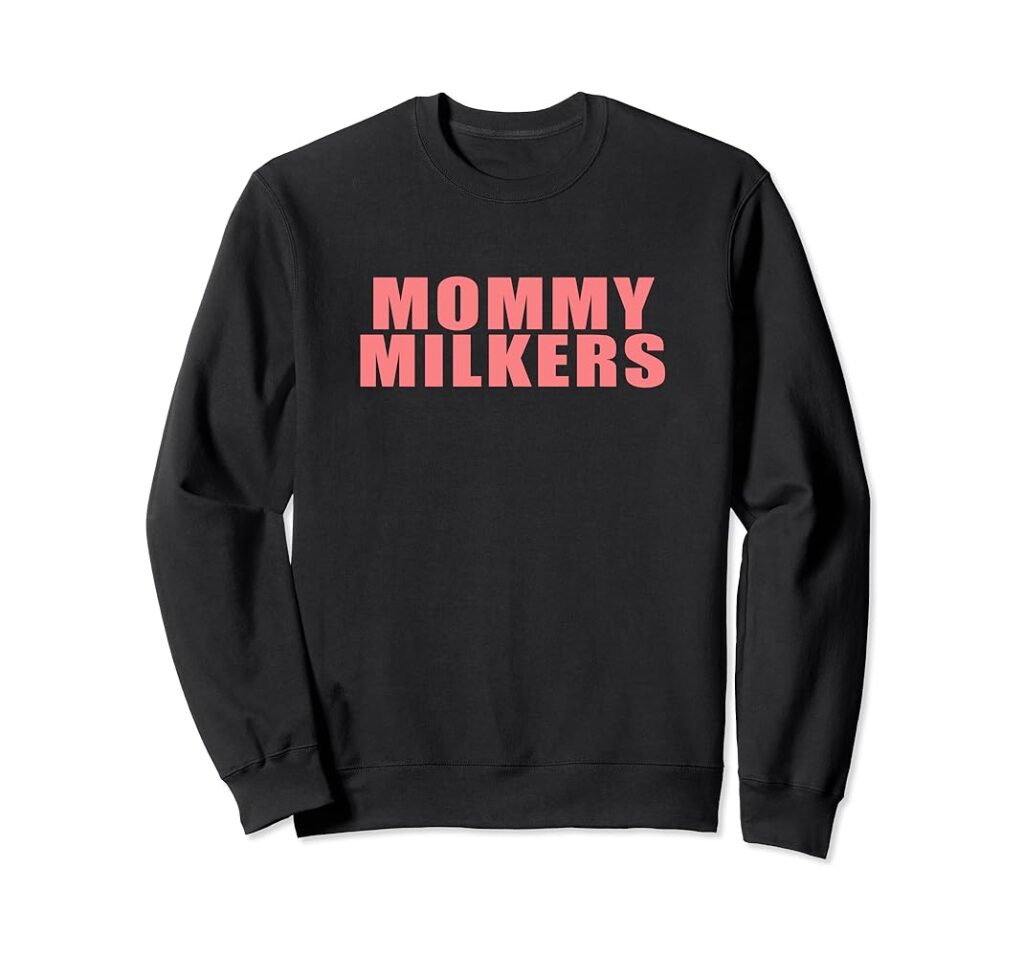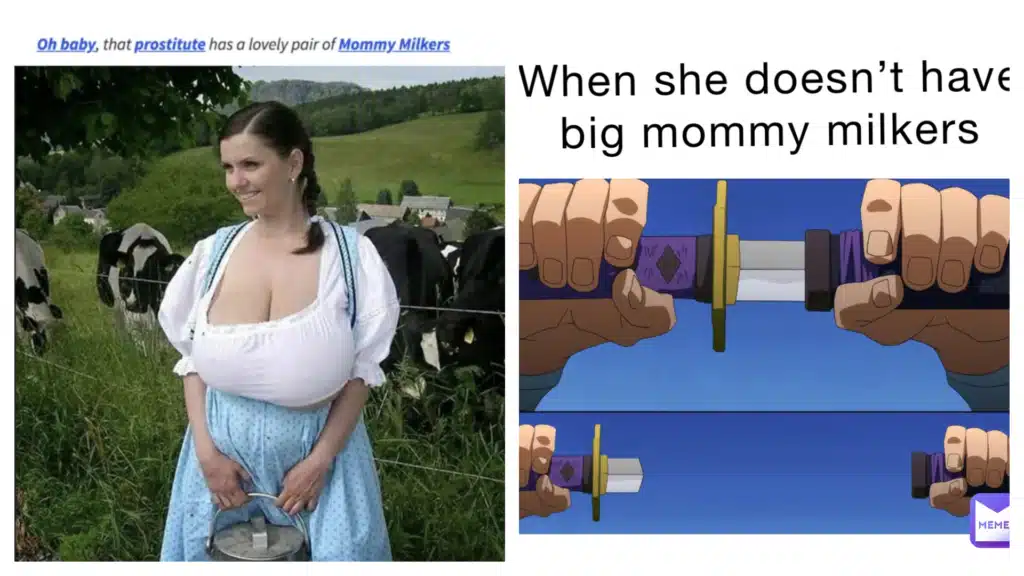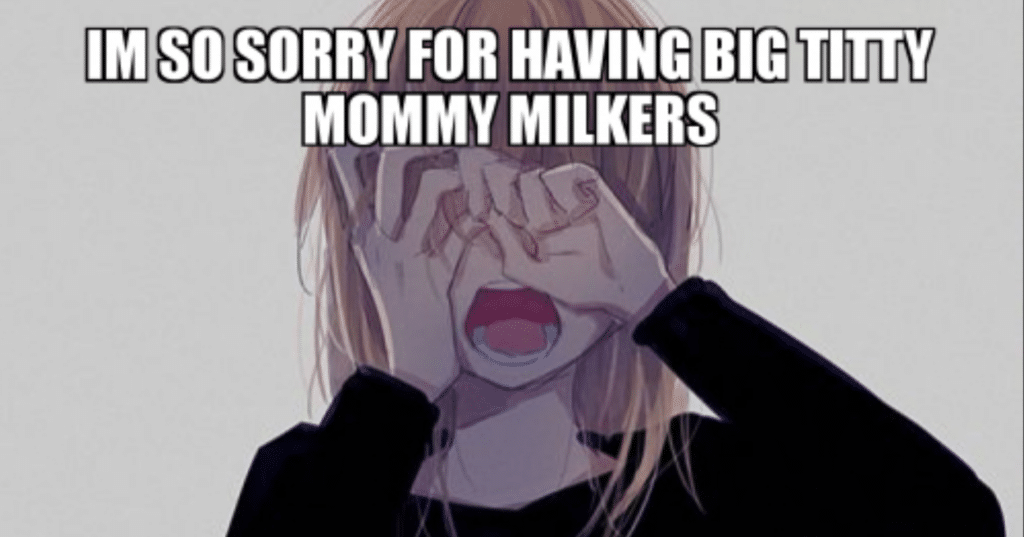Observing the rapid emergence of new slang expressions and memes within the expansive and perpetually shifting terrain of internet culture is fascinating. These linguistic novelties swiftly capture our attention and serve as catalysts for discussions that ripple across the online landscape.
One such term that has recently emerged as a noteworthy phenomenon is “Mommy Milkers.” This slang phrase, distinguished by its attention-grabbing nature, is a colloquial way of referring to a woman’s breasts within the specific context of motherhood.

This intriguing terminology raises several questions: Why has “Mommy Milkers” become a recurrent presence in online banter? What factors contribute to its widespread usage? Furthermore, what has transformed it from a simple linguistic quirk into a topic of substantial social discourse?
To explore these facets, one must delve into the multifaceted realm of internet culture, where the dynamics of language, humour, and controversy intertwine in ways that both mirror and shape broader societal trends.
Read Also: What are Trixie Tongue Tricks? A Comprehensive Guide
What is Mommy Milkers?
The phrase “Mommy Milkers” is a slang term that finds its reference in a woman’s breasts, specifically within the realm of motherhood. This quirky expression amalgamates two distinct components:
“Mommy,” an informal term denoting a mother, and “milkers,” a slang descriptor commonly employed to refer to breasts involved in the production of milk, typically associated with the act of breastfeeding.
This term frequently takes on a playful or humorous tone, making it a common fixture in the lexicon of online discourse. It is often wielded in the context of internet conversations, humorous memes, and within the confines of various social media platforms.
Its widespread usage in these digital spaces reflects the evolving nature of language and the unique blend of humour and colloquialism that characterizes internet culture.
Read Also: How Long Do Butterflies Live? Find Out Below
Origins and popularity of “Mommy Milkers”
The term “Mommy Milkers” found its origins in the vast landscape of internet culture, particularly on social media platforms where slang terminology tends to take root and proliferate at a rapid pace. Pinpointing its precise inception remains a challenge, as internet memes and trends often gain momentum without a clear or discernible source.
Nevertheless, this term ascended to popularity primarily due to its sensational and attention-grabbing nature, as it delved into discussions of breastfeeding and female anatomy in explicit or juvenile terms.
The “memeification” of “Mommy Milkers” has also significantly contributed to its online notoriety. Memes, which are humorous or satirical pieces of content comprising images, videos, or text that rapidly circulate across the internet, have played a pivotal role in disseminating this term.
These memes frequently pair the phrase with humorous or exaggerated visuals and captions related to breastfeeding or motherhood.
They propagate through social media platforms, online forums, or private messaging conversations with the aim of evoking amusement and establishing a sense of shared humour among those familiar with the reference.
However, it is crucial to recognise that while memes serve as a form of entertainment and a means to engage with popular culture, the use of “Mommy Milkers” as a meme perpetuates harmful stereotypes and objectification. The term has ignited extensive discussions concerning its broader implications and societal impact.
See Also: When Was Walking Invented?
Evolution of Mommy Milkers
The term “Mommy Milkers” has undergone a notable evolution within the dynamic realm of internet culture and meme communities, mirroring the ever-changing landscape of online communication and the emergence of fresh slang and meme trends.
Initially, it likely sprang to life as a playful and exaggerated way to reference a mother’s breasts within specific online subcultures. The term gained momentum as time progressed and was disseminated to wider audiences, primarily via social media platforms and online forums.
The phenomenon of “memeification” has been instrumental in shaping the trajectory and popularity of “Mommy Milkers.” Memes, characterised by their humorous or satirical images, videos, or text disseminated at lightning speed across the internet, have played a pivotal role in cementing the term’s recognition.
These memes frequently juxtapose the phrase with comical or over-the-top visuals and captions related to breastfeeding or motherhood. They find their way into the digital ether via social media platforms, online forums, or private messaging exchanges, intending to provoke amusement and foster a sense of shared humour.
Within the confines of online communities and comment sections, individuals actively engage in lighthearted discussions or exchanges centred around the “Mommy Milkers” meme. This involves sharing personal anecdotes, crafting whimsical scenarios, or participating in witty banter with fellow netizens.
These interactions serve as a platform for people to connect through humour and exchange comedic experiences related to motherhood. Nonetheless, it’s crucial to underscore that memes undoubtedly serve as a source of entertainment and a means to engage with contemporary culture.
The use of “Mommy Milkers” as a meme can inadvertently perpetuate harmful stereotypes and objectification. Consequently, this term has ignited extensive discussions concerning its broader implications and societal impact.
Read Also: Top 20 Shocked Meme (Origin, Evolution, Cultural Significance)
Significance of Mommy Milkers
The significance of “Mommy Milkers” hinges on its capacity to elicit reactions, often leaning toward the humorous or sexually suggestive, and to foster a sense of connection or mutual understanding among those who utilize or engage with the phrase.
It’s important to note that the significance of “Mommy Milkers” remains subjective, contingent upon the particular context and individuals involved.
- Internet Memes: Within the realm of internet memes, “Mommy Milkers” has seamlessly integrated itself. Users employ this slang and playful language to partake in online banter, transforming it into a catchphrase or meme.
Its usage often leans toward the lighthearted and comedic, aiming to elicit laughter and provoke reactions. In these digital domains, its significance lies in its power to foster camaraderie and amusement among participants in these online exchanges.
- Shock Value and Controversy: The term “Mommy Milkers” carries a certain shock value owing to its explicit and sexualized connotations. Its significance can emanate from the contentious nature of its usage, with some finding it amusing while others view it as derogatory or objectifying.
This controversy, in turn, sparks discussions and debates centring on issues such as gender, objectification, and the boundaries of acceptable language.
- Reinforcing Stereotypes: Unfortunately, “Mommy Milkers” perpetuates stereotypes revolving around women’s bodies and motherhood. Reducing a woman’s identity to her breast size or breastfeeding capability reinforces narrow and often unrealistic societal expectations.
In this context, the term’s significance lies in the potential harm it can inflict by perpetuating these detrimental stereotypes and adding to the objectification of women.
- Social Commentary and Critique: On some occasions, “Mommy Milkers” may be harnessed as a social commentary or critique tool. By appropriating and subverting the term, individuals may aim to spotlight or challenge societal attitudes concerning women’s bodies, motherhood, or the objectification of women.
In this particular context, the significance of the term lies in its ability to provoke contemplation, raise awareness, or ignite discussions about broader issues related to gender, sexuality, and societal norms.
See Also: Yalla Shoot: All you Need to Know
Implications of the Term “Mommy Milkers”
The term “Mommy Milkers” carries various implications, some of which can be detrimental or problematic. These implications originate from the sexualization, objectification, and reduction of women to their breast size or breastfeeding capabilities.
Let’s delve into these implications:
- Objectification of Women: “Mommy Milkers” objectifies women by simplifying them to their physical attributes, specifically their breasts. It diminishes their individuality, intelligence, and accomplishments, concentrating solely on their sexual allure or reproductive function.
This objectification perpetuates the notion that a woman’s value primarily revolves around her physical appearance, eroding her independence and agency.
- Body Image and Self-Esteem: The negative use of the term “Mommy Milkers” can significantly impact the self-esteem of women, particularly those with larger breasts. It can exert pressure to conform to societal beauty standards and may engender feelings of inadequacy, self-consciousness, and body shame.
Women without substantial breast size may experience exclusion or judgement, thereby exacerbating negative body image concerns.
- Impact on Breastfeeding: “Mommy Milkers” intersects with the realm of breastfeeding, a natural and crucial facet of motherhood. However, its use can create an unfavourable or uncomfortable environment for breastfeeding mothers.
It may contribute to feelings of embarrassment, shame, or self-consciousness, hindering the confidence of mothers in breastfeeding and their willingness to seek support when needed.
Read Also: 15 Funny Christmas Memes to Make you Jingle all the Way
Mommy Milkers Tiktok and Memes


See Also: Who is Katelyn Lordahl? Meet the TikTok Sensation
Conclusion
“Mommy Milkers” represents a complex and multifaceted phenomenon within internet culture and meme communities. Its significance varies widely, ranging from light-hearted humour to contentious objectification.
While it may serve as a source of amusement for some, it also carries the weight of perpetuating harmful stereotypes and impacting women’s self-esteem and breastfeeding experiences.
As internet culture continues to evolve, discussions surrounding terms like “Mommy Milkers” underscore the need for thoughtful engagement with language and its potential consequences.
Balancing humour and respect in online discourse remains a challenge, highlighting the importance of fostering awareness and promoting positive communication within the digital realm.
Ultimately, the term’s impact reflects the broader dynamics of online culture, where words can simultaneously unite, divide, entertain, and offend, depending on how they are used and interpreted.
